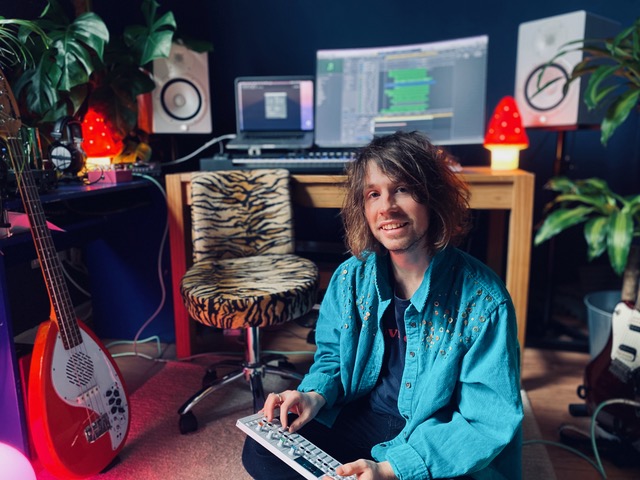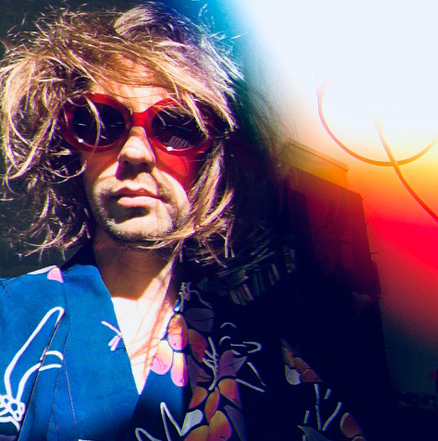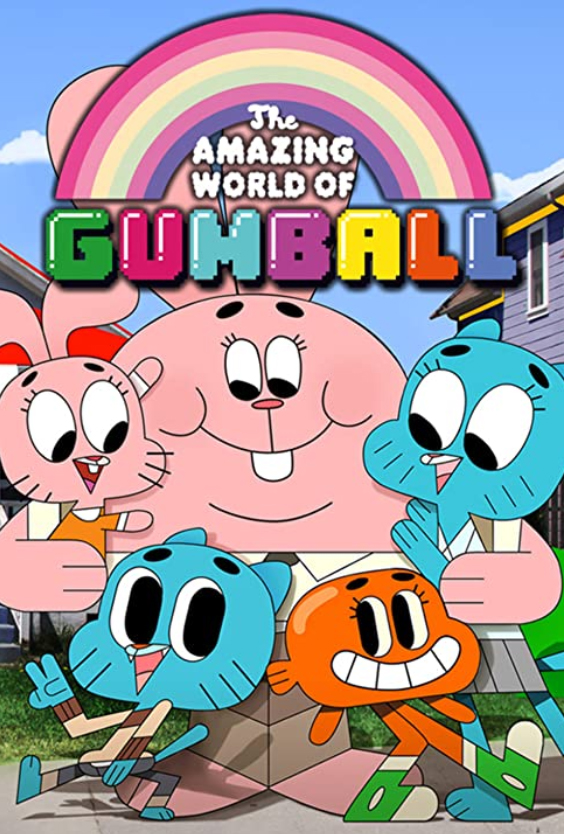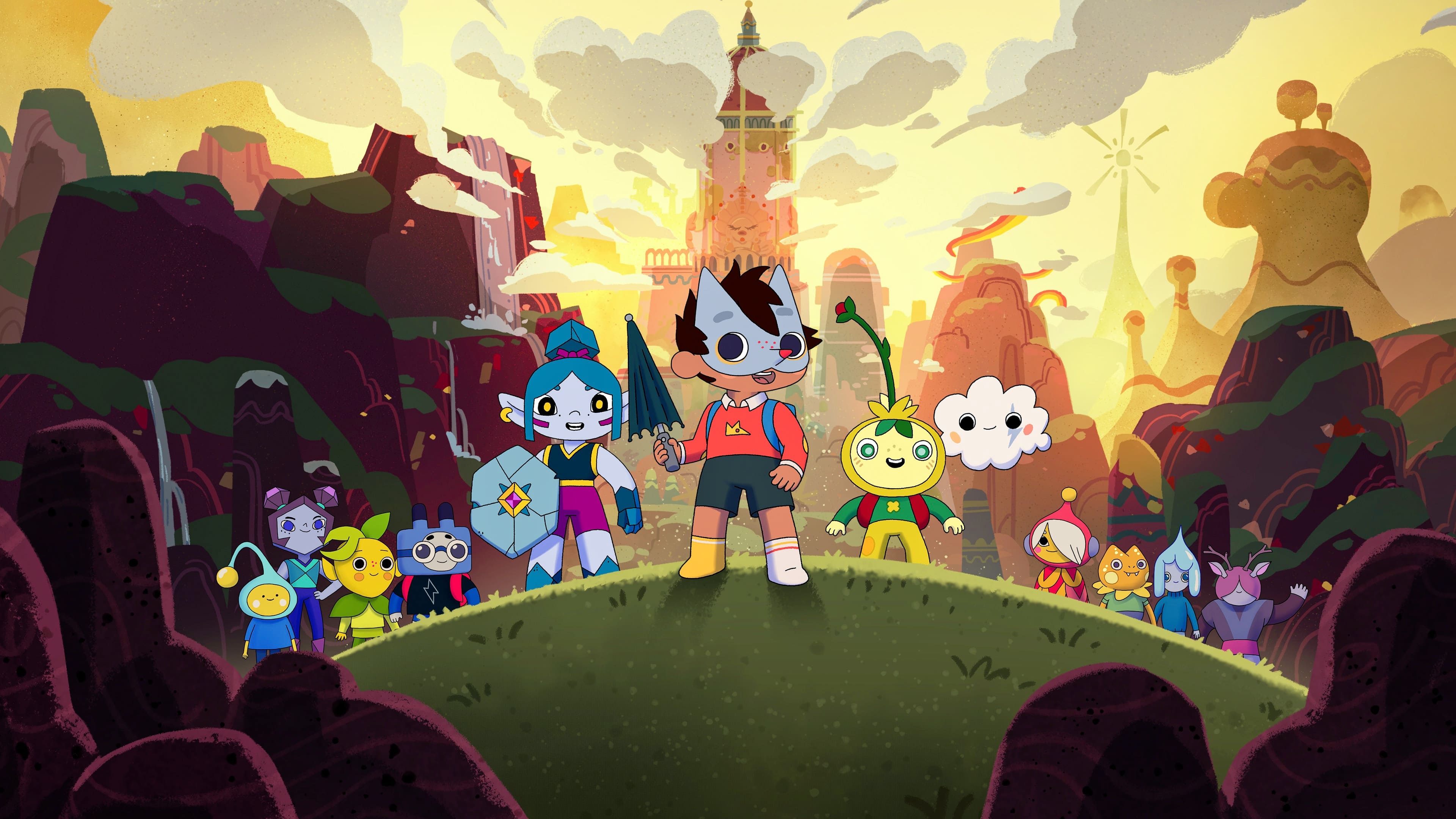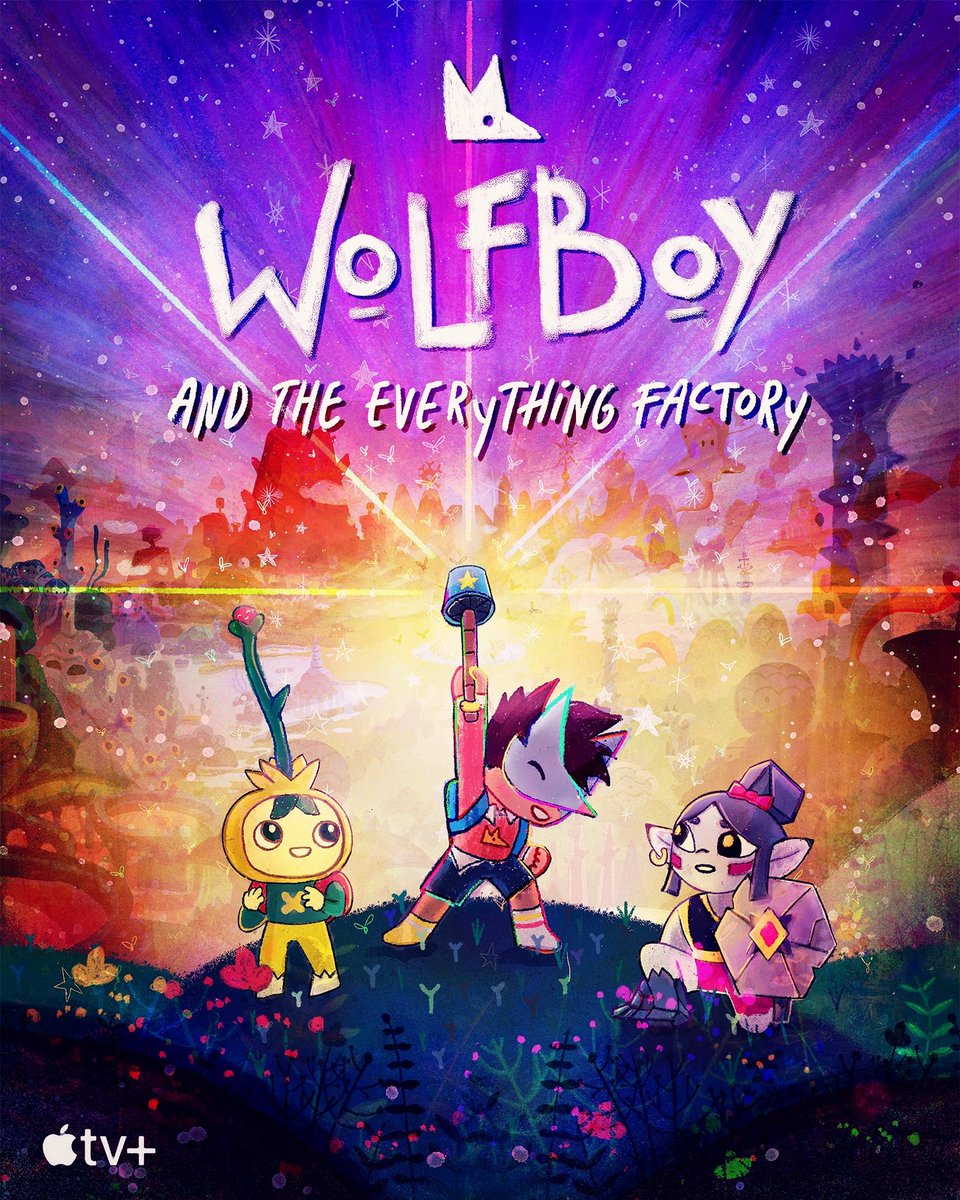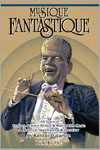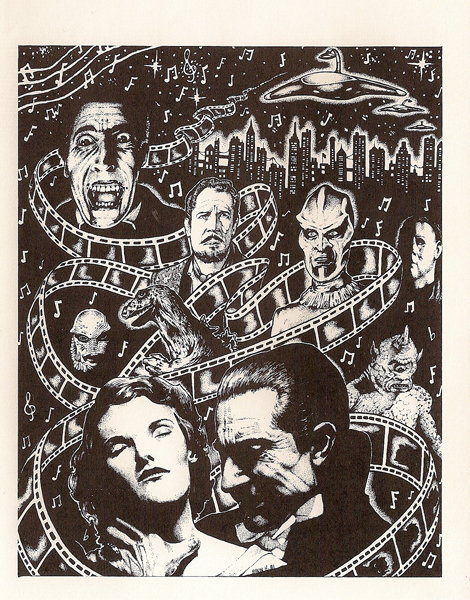October 4, 2021
Xav Clarke And The Everything Factory: The Sounds of Gumball, Elliott, and Wolfboy
Interview by Randall D. Larson
Xav Clarke is a musician and composer from Dorset, UK. He has written songs, music, and score for several animated series including the BAFTA winning series from Cartoon Network THE AMAZING WORLD OF GUMBALL, the Sci-fi adventure ELLIOTT FROM EARTH, and most recently the Joseph Gordon-Levitt produced WOLFBOY AND THE EVERYTHING FACTORY for Apple TV+.
As a musician Xav produces his unique brand of psychedelic pop with bands Itchy Teeth, Captain Fix & The Midnight Honeys, and Starfish Men. Playing in bands and writing songs since a teenager, Xav has spent as much time in his bedroom making records as he has touring Europe with his band and experimenting live. As a guitarist Xav has appeared in Danny Boyle’s film YESTERDAY, performed on soundtracks, and been lucky enough to work with acclaimed composers Daniel Pemberton and Michael Giacchino. Xav’s debut solo album, the psychedelic and dreamy ‘Magic Arrow’ will appear this year, with a run of singles leading up to the release.
WOLFBOY AND THE EVERYTHING FACTORY follows an oddball dreamer named Wolfboy as he discovers a strange realm where fantastical beings create things for the natural world above. To score the series, Xav was given the brief to “go weird, be experimental, and take chances.” What he created is an organic score as playful, curious, and creative as the titular character himself. His music has a purposeful roughness to it in keeping with the creative mantra to make it sound as if Wolfboy could have made the music himself in the Everything Factory.
I’m pleased to have had the opportunity to interview Xav about getting involved with TV scoring, his music for WOLF BOY AND THE EVERYTHING FACTORY, and his unique take on music for films and television. – rdl
Watch the trailer for WOLF BOY AND THE EVERYTHING FACTORY::
WOLFBOY: When I’m writing music for these shows I feel that the imagination of a child is so much grander than a lot of other shows might give credit for. I think that sometimes there’s a tendency, probably not from the thought of the composer, but maybe from an executive somewhere, to dumb the music down a bit, because it’s supposed to be appealing to kids. I certainly want the music I make for these shows to be emotionally sophisticated if it needs to be.
Q: You’ve been a musician and composer for some time now, but are relatively new to scoring for film projects. What brought you into film scoring and how did your earlier career in music prepare you for the world of film music composition?
Xav Clarke: I always played in bands, and when I went to University, my friend Charlie and I realized that we weren’t very much interested in the course, and that we wanted to be in a band together. So we formed a band, it was called Itchy Teeth. We did that really as the main thing for many, many years. We went on tour and we had odd, random jobs. One of the random jobs I had was working in a studio which did foley, sound design, and voice overs for animation, as well as other projects. There I met some people and when they found out I was a musician as well they asked me to write a song or two for a show. It steamrolled from there. It wasn’t something I ever realized, consciously, that I wanted to do, but I found that coming from a background of being in a band, coming from a different place, was actually quite advantageous because, I guess, I brought a certain different perspective or sound, because I hadn’t studied the usual way. So that was really how it happened for me, and that was how I fell into scoring for television.
Q: Your first show was THE AMAZING WORLD OF GUMBALL for Cartoon Network – you’re credited with “additional music” for several episodes of the series. What was that experience like?
Xav Clarke: That was one of the shows that the studio I worked for had been doing, and I began writing some songs for. The main composer for THE AMAZING WORLD OF GUMBALL is a guy called Ben Locket, who was the series composer right from the beginning. He’s absolutely amazing. For reasons which I know not, he didn’t write the songs for GUMBALL, so they would draft in other composers. One of the voice directors, Richard Overall, very kindly asked me if I wanted to write a song for the show, which turned out to do quite well online and became a big moment in the season where lots of the characters sing together. The song was called “Weird Like You and Me.” I think it was a success for the show and they were really happy with it, so from there on I went on to write more songs for the series, and eventually managed to do some score as well, in the background, for an episode called “The Father.” I wrote a song at the beginning of it, called “The Vermin Man,” and they wanted the melody of that song to continue throughout the show so that, even in the sad moments in the score, it would call back to this theme. That was my first foray into writing music for animation and getting into that world.
Q: What brought you into scoring the science fiction adventure ELLIOTT FROM EARTH for Cartoon Network, and what can you tell me about scoring that show?
Xav Clarke: That was a big leap for me. That came through making connections on THE AMAZING WORLD OF GUMBALL. Some of the people who worked on that went on to make ELLIOTT FROM EARTH and they told me about it quite early; and they said “You know, you should pitch on it!” So I put together lots of songs and wrote a theme tune that I thought might go with the show, but I really didn’t know much about it because they were really in early development stages. Then there was a period of about a year and a half where they were just developing the show and weren’t deciding anything, but I still wanted to show them that I was really interested so I would send them little bits of music. Then, at the end of that, there was a formal pitch process where they got composers to do various scenes from an animatic, and luckily I won the pitch and went on to score the show.

It was a big jump for me because it was really then, going from writing songs and doing tiny bits of score here and there, to doing sixteen episodes of eleven minutes each for a very grandiose sci-fi adventure. They wanted it to be really orchestral – and I hadn’t worked with orchestral instruments before, so for me it was a new thing. I thought, again, I’ll try and teach myself about arrangements and I’m going to go for it. I wanted to put myself into it, too – I wanted to play lots of live guitar. I wanted to bring that into the score, and bring things into the score that were more individual to me as well. I’ve said this before, but when I was making the music for ELLIOTT FROM EARTH, I kept imagining the first time I saw 2001: A SPACE ODYSSEY, the film, and I watched it on a tiny television with broken speakers, but it had such an incredible impression on me and kicked off a huge love of sci-fi, so I wanted to try and recreate that in the sound. There was this analog warmth to the recordings and a kind of golden-y fuzzy hum to the music that really caught your imagination.
Watch a music video of Xav Clarke performing “The Lab Suite” from WOLF BOY AND THE EVERYTHING FACTORY:
Q: With WOLFBOY AND THE EVERYTHING FACTORY for Apple TV+ you’ve provided a richly nuanced score that supports both the character drama and the world in which the story takes place, surrounding the series with an air of whimsy and fun. How did you become involved in this project and what were your initial conversations with the filmmakers about what they had in mind for music?
Xav Clarke: They asked me to pitch on the show, which was a big honor. As soon as I saw the animatic I absolutely fell in love and I thought, “I’m going to have to do anything possible to try and work on this show!” The initial conversations that we had were that they really wanted the music in the show to sound like Wolfboy could have made it himself, because a lot of the artwork in the show is very hand-drawn, it’s got a very crafts-y vibe, and so they really wanted it to be warm and be an extension of his imagination. However, what they also said was that they really wanted it to be unusual. They wanted it to be different, like the show itself and the setting of the show in this magical world called The Everything Factory, where sprites work. They wanted the music to be something new that would reflect that. Apple TV and also the creators of the show, Edward Jesse and Toff Mazery, and some of the producers working on the show, they were always pushing me to be strange and to take chances, really; to do an unusual score. So it was all about looking for bizarre ways to use instruments and steering away from very synthesized bits of encoded sound and moving toward unusual ways that I could use normal instruments in strange and manipulated ways to create something new.
Q: What was your musical palette in creating the music for WOLFBOY?
Xav Clarke: I didn’t have access to an orchestra for the show, so I used some orchestral libraries when I did need to bring in orchestral instruments. I used a lot of Spitfire Audio samples and I used some samples by Output, but mostly the palette was making samples of my own instruments myself, trying to manipulate them in strange ways, and put them to effects pedals and pitch them up or pitch them down. I would assign them to my keyboard and that gave me a short cut to play them in a slightly stranger way than just playing the actual instrument. It was like I would make a sample of the instrument and then twist it to sound a bit different so that it was vaguely reminiscent of a sound that you’ve heard before but with extra magic on top – that’s the way I like to think about it. I bought a new Fender Rhodes piano before undertaking this show and I used that a lot on it. I also used my voice quite a lot; I sampled that and I sung lots of bits, and I used fuzz pedal as a prominent sound in the show, putting things through fuzz pedals and delays. The recorder was another classic instrument that came out quite a lot. I’m a big fan of the recorder, and I liked putting that through distortion and delay and using it for a percussive sound instead of a melodic one, and things like that.
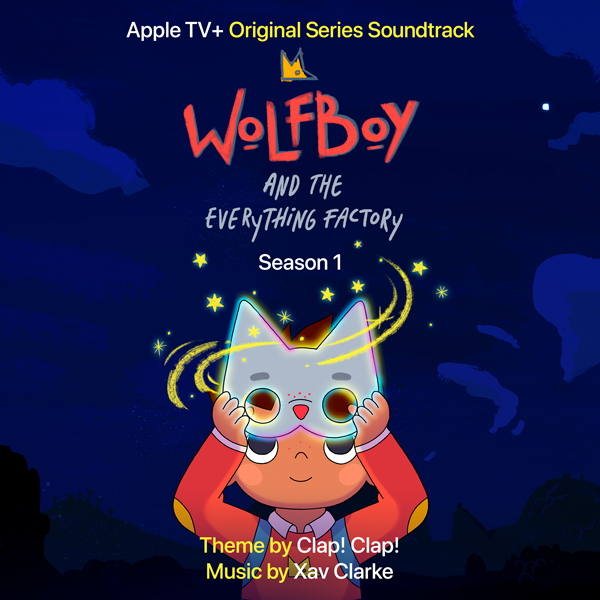
Q: How would you describe the score’s thematic or motific design?
Xav Clarke: It was very important for the creators of the show to have very large themes in the music, which was also where I wanted to go with music too, so this was something we all agreed would be the right approach for the show. In the show there’s scenes of creation and of destruction, and the balance of those scenes. Of course creation from the outside always looks beautiful – we think of creation as the only thing, but the show really goes on to explore the fact that destruction is absolutely as necessary as creation, and that destruction isn’t so much a bad thing, inherently, but it’s just part of the cycle of creation. So we wanted themes and sounds for both those things, as well as character themes. I also worked on creating sounds and themes for the Everything Factory, where all the things are made for the world in the show, and the different labs where they make rain, they make clouds, they make time, and in each of those labs there needed as well a unique sound palette for those worlds. Everything had to be very thought out and if I was going to do a theme it had to be adapted as well for the lab in which it was in, so that it would sound inherent to that environment. That was a really fun and fulfilling challenge in working on WOLFBOY, thinking about sound and melody in terms of theme.
Q: ELLIOTT FROM EARTH and WOLFBOY are both tales of fantastic adventures. How did this science fiction-esque genre enable you to create particularly imaginative music in delineating the worlds in which these characters and stories exist?
Xav Clarke: When I was thinking about how I would approach the science fiction genre – it’s a genre that has been well and truly mined – I recalled Hans Zimmer’s incredible organ in INTERSTELLAR to the more traditional sounds of theremins and stuff that you’d associate with the ‘50s. It’s like everybody has had their take on a new sound for science fiction, and I just thought I would try and do what was most organic and natural to me, which is that I’m a guitar player and a bass player, and I really wanted to include those instruments, but more than anything I wanted to make melody the center. So instead of thinking about conventions of science fiction I wanted to draw attention to the feeling of Elliott in space, the feeling of missing his connection to his home world, and I wanted melody to play a big part. I wanted his theme to be adaptable in a variety of situations and to show you the different feelings he’s experiencing of missing his home but also feeling adventurous in his new surroundings. That definitely set me up in WOLFBOY for the idea of trying to get into a character’s mind when they’re on an adventure. So with all those different genres I feel that it was a good practice for me to get inside the head of Elliot, to get inside his emotions, and I realized that was something I also wanted to do on WOLFBOY. I want people to feel what it was like for Wolfboy experiencing these crazy things in this crazy world as well as just representing them in sound. I really wanted to draw attention to his emotions.
Q: While these shows are essentially children’s programs, your music is not what I’d describe as children’s music. How did you approach scoring the show and keeping the music vivid and supporting of the story when dealing with Wolf Boy’s facing against the forces of fantasy and danger, such as the destructive Dissarays, as the story progresses?
Xav Clarke: That’s a great question and I’m really glad you asked it because I think, for me, although I work in scoring what might be described as children’s shows, my focus really is to not treat them like a children’s show in any way. In the music I make, I try not to dumb-down any emotion or to try and make anything less sophisticated because you think that that’s what children like to listen to. I think on the contrary, I remember being a child, coming down on Boxing Day and hearing John Williams scoring STAR WARS, I think it was the Battle of Hoth and Leia’s Theme, and I remembered just how sophisticated in context that was and how much it tugged at my heart strings and how much emotion was in it. I try and think back on that when I’m writing music for these shows because I feel that the imagination of a child is so much grander than a lot of other shows might give credit for. I think that sometimes there’s a tendency, probably not from the thought of the composer, but maybe from an executive somewhere, to dumb the music down a bit, because it’s supposed to be appealing to kids. A friend once said to me that kids love Nirvana, and that’s something I agree with also – it’s all about what they’re exposed to. I think children can feel extremely complex emotions. WOLFBOY is probably attracting kids from ages six to sixteen, I would roughly guess, and I certainly remember at that age experiencing some of the most complex and confusing and powerful emotions that I have ever experienced in my life. I certainly want the music I make for these shows to reflect that, to not shy away from that, and to be emotionally sophisticated if it needs to be.
Q: What have you found most challenging about scoring WOLFBOY?
Xav Clarke: [laughs] Well, kind of a dumb answer, but I’d probably say the schedule! It was very difficult. The thing that got me through was the absolute love of the show. Each morning waking up I would be excited about hanging out with the characters, and I really grew to love them and the freedom that Apple and the creators of the show gave me, which meant that everyday was a joy to work on the show. But at the same time we were doing about an episode a week, so between 22 and 25 minutes a week and also working on revisions on the previous episode at the same time. I didn’t want the quality to slip – obviously you always want to be doing your best work and you want to approach each new scene with the same vigor that you have the last one, so I’m very lucky. Before I started the show I moved to a new flat which is right on the seaside in England, so my breaks would usually involve me nipping out the door and going for a freezing swim – we were working on this in February and that certainly got the juices flowing, jumping into the sea for a few minutes, and those would be my breaks. The schedule was extremely full on, which had its advantages but disadvantages as well, so that was the hardest thing. But, you know, we all managed it and I knew I wasn’t the only one on the show going through that schedule. I think it was the same for everybody, so it was nice to know we were all in it together.
Q: Where would you like to see your own journey in scoring films and television taking you in the future?
Xav Clarke: Well, it sounds cheesy, but the journey I’ve been on so far I couldn’t wish to have been any better, so I feel wherever it’s going to go next will also be the right place. I would love to be at the beginning of one of those big films that touch so many people, and I would like obviously to move towards bigger exposure. I love epic films like STAR WARS and LORD OF THE RINGS, and I love Pixar films – I would love one day to be working on something like that. However, the universe often has other plans, and the plans it’s had for me have been great and I’m really happy rolling with them.
Thanks to Andrew Krop and Kyrie Hood of White Bear PR for facilitating this interview. Lakeshore Records has released WOLFBOY AND THE EVERYTHING FACTORY Season 1–Apple TV+ Original Series Soundtrack –available now digitally. The album features score by Xav Clarke and the series theme song, “Excaliboom!” by Clap! Clap! (aka Cristiano Crisci)

